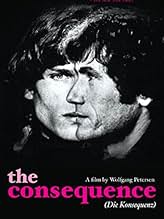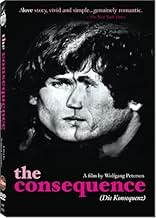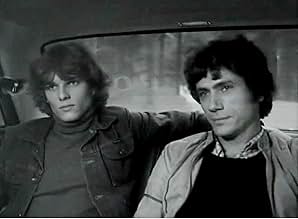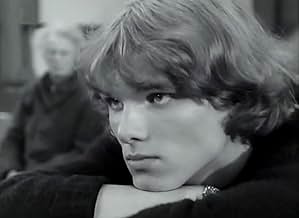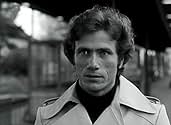IMDb-BEWERTUNG
7,2/10
1123
IHRE BEWERTUNG
Thomas verliebt sich in den Häftling Martin und verführt ihn. Als Martin aus dem Gefängnis entlassen wird, versuchen sie, eine Beziehung und ein gemeinsames Leben aufzubauen, aber niemand lä... Alles lesenThomas verliebt sich in den Häftling Martin und verführt ihn. Als Martin aus dem Gefängnis entlassen wird, versuchen sie, eine Beziehung und ein gemeinsames Leben aufzubauen, aber niemand lässt sie in Ruhe.Thomas verliebt sich in den Häftling Martin und verführt ihn. Als Martin aus dem Gefängnis entlassen wird, versuchen sie, eine Beziehung und ein gemeinsames Leben aufzubauen, aber niemand lässt sie in Ruhe.
- Auszeichnungen
- 1 Gewinn & 1 Nominierung insgesamt
Hans-Michael Rehberg
- Anstaltsleiter Direktor Rusterholz
- (as Hans Michael Rehberg)
Empfohlene Bewertungen
This film certainly deserves to be better known. I think with gay cinema evaluations have to be made in the context of the era in which they were made. The simplicity, honesty, brutality, and directness of this story is exceptional for the time.
It's a slender story, familiar yet different. Familiar insofar as the difficulty of maintaining a same sex relationship, especially when there is a significant age difference. But different in that it deals with a harsh (and somewhat incomprehensible) penal system. Nevertheless, American gay men will be able to relate, and translating 1970s Switzerland/Germany to a similar present-day experience will not be difficult at all. Unfortunately for us, this is a story I'm sure is happening every day all around the world.
It's fascinating to see a younger Jurgen Prochnow. The other lead, the beautiful young man, was and is unknown to me, but his performance is exactly right. All the performances are spot on, in fact.
If there is an amateurish aspect to this film, it's the uneven (sometimes) grainy photography. Perhaps it was shot on 16mm and blown up. The subtitles (on the Netflix version I saw) are white, and impossible to read whenever they fall on a white background. That happens a lot, unfortunately. This is a movie that deserves better.
Definitely worth seeing.
It's a slender story, familiar yet different. Familiar insofar as the difficulty of maintaining a same sex relationship, especially when there is a significant age difference. But different in that it deals with a harsh (and somewhat incomprehensible) penal system. Nevertheless, American gay men will be able to relate, and translating 1970s Switzerland/Germany to a similar present-day experience will not be difficult at all. Unfortunately for us, this is a story I'm sure is happening every day all around the world.
It's fascinating to see a younger Jurgen Prochnow. The other lead, the beautiful young man, was and is unknown to me, but his performance is exactly right. All the performances are spot on, in fact.
If there is an amateurish aspect to this film, it's the uneven (sometimes) grainy photography. Perhaps it was shot on 16mm and blown up. The subtitles (on the Netflix version I saw) are white, and impossible to read whenever they fall on a white background. That happens a lot, unfortunately. This is a movie that deserves better.
Definitely worth seeing.
Jürgen Prochnow gives a beautifully shaded performance as a man entering prison, charged with pedophilia. While there, he joins a theater group that puts on another prisoner's play. One of the guard's teenage joins the cast. He and Prochnow quickly become involved and the boy finds a way to hide in the prisoner's cell. There are many further developments, No Spoilers here. This is a very well-made film, with very capable actors, intelligent writing, and top-drawer b&w cinematography. Made 5 years before director Wolfgang Petersen's breakthrough with DAS BOOT (also starring Prochnow), this excellent film deserves to be better known.
In Wolfgang Petersen's filmography , "die Konsequenz " is an anomaly; filmed in stark black and white -the cinematography is splendid indeed,the buildings and even the trees seem to imprison the heroes, even when they are "free" -;utterly uncompromising,with a conclusion in the shape of a question mark :this ending,for its simplicity ,is the strongest that this desperate work could have.
Fifty years ago,so horrendous were the chances taken by the director that ,with another lesser talent, the film could have ended in the gay porn ghetto whereas it's genuine art house cinema ; essentially psychological drama , naked scenes kept to an economic level , but humiliating homophobic scenes are constant ,nothing is spared the viewer and the fact that such a harrowing screenplay succeeds artistically without falling into the trap of sentiment is entirely due to the director's ,Jürgen Prochnow 's and his co-star's feeling for sparseness and restrain which preclude all forms of conventional sentimentality and pathos.
And yet, emotion is overwhelming in the admirable scene of the lovers alone in the cell,perhaps inspired by Jean Genet's short "un chant d'amour" ;two mises en abyme really fit into the story , particularly the first play where all the roles are played by men; but the moments of happiness are few and far between ; it is the depiction of a descent into hell; in a macho world where the instructors are given carte blanche to make men out of these "criminals", where even the inmates are ,with the exception of the young boy whose best friend hung himself in his dungeon ,ruthless enemies ; women ,who are almost absent in the whole movie, are not spared either:Frau Manzoni is the submissive housewife flesh on the bone; but nymphomaniac Babette is not even a human being ,but a sex machine : the scene is scary ,unbearable and makes the viewer look away.
When the whole world is against you, the only thing you can do is to accept your fate :that's what's the elder calls "instinct of self-preservation"; but his young lover's so called healing is only a façade : even the uneducated mate has understood his mind was undone .
An admirable plea for tolerance,at a time when the "marriage for all " did not exist , Petersen made a convincing manifesto on behalf of the LGBT.
Fifty years ago,so horrendous were the chances taken by the director that ,with another lesser talent, the film could have ended in the gay porn ghetto whereas it's genuine art house cinema ; essentially psychological drama , naked scenes kept to an economic level , but humiliating homophobic scenes are constant ,nothing is spared the viewer and the fact that such a harrowing screenplay succeeds artistically without falling into the trap of sentiment is entirely due to the director's ,Jürgen Prochnow 's and his co-star's feeling for sparseness and restrain which preclude all forms of conventional sentimentality and pathos.
And yet, emotion is overwhelming in the admirable scene of the lovers alone in the cell,perhaps inspired by Jean Genet's short "un chant d'amour" ;two mises en abyme really fit into the story , particularly the first play where all the roles are played by men; but the moments of happiness are few and far between ; it is the depiction of a descent into hell; in a macho world where the instructors are given carte blanche to make men out of these "criminals", where even the inmates are ,with the exception of the young boy whose best friend hung himself in his dungeon ,ruthless enemies ; women ,who are almost absent in the whole movie, are not spared either:Frau Manzoni is the submissive housewife flesh on the bone; but nymphomaniac Babette is not even a human being ,but a sex machine : the scene is scary ,unbearable and makes the viewer look away.
When the whole world is against you, the only thing you can do is to accept your fate :that's what's the elder calls "instinct of self-preservation"; but his young lover's so called healing is only a façade : even the uneducated mate has understood his mind was undone .
An admirable plea for tolerance,at a time when the "marriage for all " did not exist , Petersen made a convincing manifesto on behalf of the LGBT.
I saw this film at the Gate Cinema near Bayswater, over twenty years ago. It was searingly good, in story content, composition and style. I was left feeling such a strong sense of anger at the way the two principal characters were hounded, anger at the bigotry and hypocrisy of those in authority, and desperately saddened by the outcome. This reflected my own feeling of dejection, rejection and utter desolation. From time to time over the past twenty or so years, I have thought of this film, especially the scene at a railway station where the two, almost against the odds, meet up and reaffirm their love for each other. It seems as if all will now be okay and that they might make away from their 'prison' but this moment of hope is destroyed so unexpectedly, and ruthlessly, that it would have been better if they had never met again. I hunted the film database to find this film, just so that I may at last tell someone else something about it, and to urge you to view it if you can get hold of a copy.
Beautiful black and white cinematography is the main pillar this modest and distressing coming-out drama rests. The script is intelligent without being intellectual, and has some amazing and surprising scenes. Main cast members Prochnow and Hannawald are excellent; Wolfgang Petersen handles the laymen cast very well.
I do not think that (20 years after date) this film has lost any actuality. Besides, this film is honest, unsentimental and without sensationalism, something that can not be said of the average mainstream coming-out film of the 80' and 90's.
I do not think that (20 years after date) this film has lost any actuality. Besides, this film is honest, unsentimental and without sensationalism, something that can not be said of the average mainstream coming-out film of the 80' and 90's.
Wusstest du schon
- WissenswertesWhen network ARD broadcast the movie, the local Bavarian station BR refused to show it because of its plot about homosexual love.
- Zitate
Thomas Manzoni: I think it's really rotten of them to lock you up like this for making love to a boy.
- VerbindungenFeatured in Schau mir in die Augen, Kleiner (2007)
Top-Auswahl
Melde dich zum Bewerten an und greife auf die Watchlist für personalisierte Empfehlungen zu.
- How long is The Consequence?Powered by Alexa
Details
- Laufzeit1 Stunde 40 Minuten
- Farbe
- Sound-Mix
- Seitenverhältnis
- 1.37 : 1
Zu dieser Seite beitragen
Bearbeitung vorschlagen oder fehlenden Inhalt hinzufügen

Oberste Lücke
By what name was Die Konsequenz (1977) officially released in Canada in English?
Antwort

